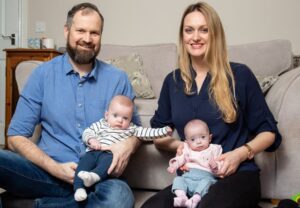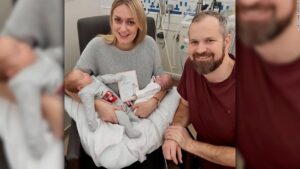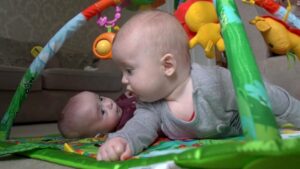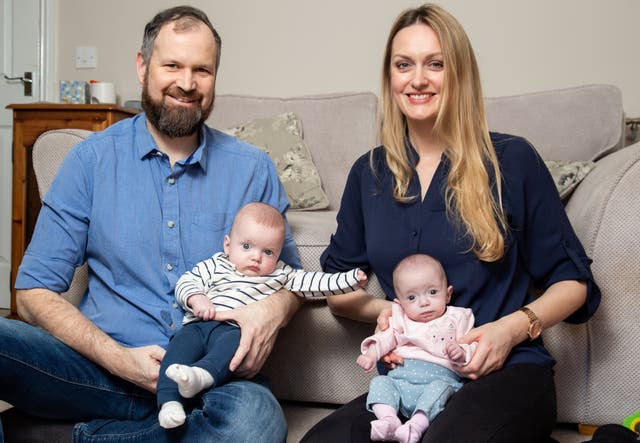The close-ups of Noah, taken by ultrasound at seven and 10 weeks pregnant, showed mother Rebecca Roberts, 39, and father Rhys Weaver, 43, the baby they had been trying to conceive for more than a year. anus.
Then, at three months pregnant, Noah suddenly had company.An ultrasound done at week 12 showed that Noah had an unexpected baby sister: fraternal twin Rosalie.”I got pregnant when I was already pregnant, which was absolutely crazy…because that’s not supposed to happen,” Rebecca said.
Baby Noah was joined in the womb by fraternal twin Rosalie about three weeks after Noah’s conception.Called superfetation, getting pregnant while she’s already pregnant is so rare that a 2008 study found fewer than 10 reported cases worldwide. Doctors told the couple that the babies were conceived three weeks apart, Rebecca said.

“They noticed that the baby was growing at a steady three week rate from the first, and that’s when they told me, they think this is a superfetated pregnancy,” she said.”I couldn’t believe it happened to me,” Rebecca added with a smile. “But she did it, it’s lovely. It’s like winning the lottery.”
Dad felt the same way: “I was elated to have a son, but even more so to have twins. The job is done in one fell swoop! And then Rebecca did some digging and we realized how unique and lucky we were.”Superfetations are rare for a variety of reasons, said Dr. Lillian Schapiro, an Atlanta-based gynecologist.

First, women typically ovulate only once per cycle, releasing one or more eggs simultaneously. If fertilization by the man’s sperm is successful, the egg or eggs implant in the uterus, pregnancy begins, and no further ovulation occurs.Conceived while Rebecca was already pregnant, baby Rosalie was a rare “medical wonder.”
“If a woman has twins,” Schapiro said, “two eggs are released at the same time. And in the unusual case of triplets, all of those eggs are released with one ovulation.” Identical twins occur if a newly fertilized egg splits.
In Rebecca’s case, the egg was fertilized and implanted during her first ovulation, and “somehow she ovulated again during that same cycle,” Schapiro explained. “Another egg was also fertilized, became another embryo, and at different times both embryos implanted in the uterus.”

Another reason superfetations are rare, Schapiro said, is that once pregnancy begins, the uterus is no longer a hospitable site for implantation. That means the second embryo “must have managed to implant and grow to a stage where we wouldn’t have thought it could grow.”
“We’ve hardly ever seen where two embryos start to develop at different times,” Schapiro said. “That’s nothing short of amazing.”
Rebecca had just taken a dose of fertility drugs designed to stimulate ovulation before conceiving Noah. While that may be one reason for this rare occurrence, Rebecca said, it could also simply be a “medical marvel.”
‘Little, little baby’
At first, Rebecca and Rhys worried about baby Rosalie’s development in the womb, worried that her being so far behind her older brother would affect her health at birth.
“She could go either way,” Rebecca said. “Because the baby is so much smaller, there could be something wrong with it and she may not survive. That is often the case.”
“But they said this baby is actually growing all the time,” she said. “It was a relief. It was a huge relief.”

Born by C-section in September 2020, both babies had to spend time in separate neonatal intensive care units (NICUs). Rosalie, who was born at a tiny 2lbs, 7oz, was sent to a specialized NICU about 15 minutes from the NICU that cared for Noah, who was born at 4lbs, 10oz.
“She was a tiny, tiny baby that fit in our hands, and even though she was tiny, you could see that she was a much bigger baby,” Rebecca said.
“It was very difficult. I had a major operation and then our babies were also in two separate hospitals,” she said. “So it was a lot of hard work having to travel between the two.”

At birth, Noah was nearly twice the size of his little sister.
Noah was able to come home in three weeks, but little Rosalie stayed in intensive care for 95 days, coming home just before Christmas.

